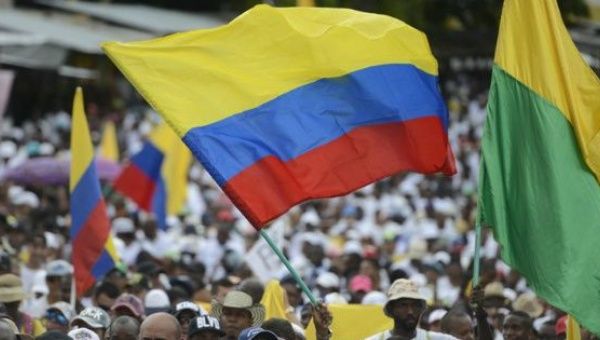Human rights defenders in Colombia are being assassinated in the regions of Cauca, Antioquia, Nariño, Chocó and Cauca Valley. The killing spree has been on the rise in recent times with incidents occuring every week and sometimes, even daily. This genocide that confronts peace has produced consternation in society.
On July 6, a report titled ‘All Names All Faces’, presented by the Peasant, Ethnic and People’s Agricultural Summit, the Marcha Patriótica (a Colombian political and social movement) and the Institute of Studies for Development and Peace (INDEPAZ), noted that 123 social leaders had been assassinated between January 1 and July 4.
On July 4, Ana Maria Cortes, who coordinated the campaign of presidential candidate Gustavo Petro during the recent elections, was murdered in the city of Caceres. Four more activists were murdered on the same day.
In the nine days before July 4, seven social leaders had been murdered in the country. On June 25, José Abraham García, president of Communal Action Board (JAC) of Verada Pascuita, was assassinated in the town of Ituango, Antioquia. Two days later, Julio Cesar Sucerquia, member of the Association of Barequeros committees of North of Antioquia, was killed by several heavily armed men.
On June 28, peasant leader Carlos Hidrobo Navia was approached in the area of El Patía, in the south of Cauca. Several men forced him to get down from his bike and shot him multiple times. The next day, Iván Lázaro, another peasant leader, was assassinated while he was resting in his room in the Córdoba Department. On July 3, Gabriel Correa, the city councillor of the municipality of Buenos Aires in the north of Cauca, was murdered.
The Association of Indigenous Town Councils of the North of Cauca-Cxab Wala Kiwe–ACIN, condemned the recent events and called for unity, resistance and mobilization against the deaths.
After these crimes came the news of the assassination of two more social leaders: Felicinda Santamaría (president of Communal Action Board (JAC) of Virgen del Crimen neighborhood) in Chocó and Luis Barrios (communal leader of Palmar de Varela) in Atlántico. Again, on July 3, seven bodies riddled with bullets were found in the region of Argelia in the Cacua department.
What concerns human rights defenders and citizens in general with regard to the massacre in Argelia is that just a few days before the massacre, José Miguel Vivanco, Director for Latin America of the NGO Human Rights Watch, and human rights defender whose work has often revolved around Colombia, flagged the circulation of a pamphlet full of threats in the municipality where the incident took place.
Many pamphlets with such threats are being circulated by various unknown groups on social media. Activist Maria Jose Pizarro, the daughter of Carlos Pizarro (former commander of M-19, Colombian guerilla movement) shared some of them on Twitter.
It is worth highlighting that in its communiqué, the indigenous communities of Cxhab Wala Kiwe note that the transition in the national government, which is in truth being led by former President Álvaro Uribe Vélez, has essentially caused a resurgence of hate speech in the paramilitary ranks and therefore, the number of their leaders that are being silenced is increasing. “We are aware of the changes that the country is experiencing and the path of destruction imposed by the new national government. Although the elected president has not yet taken office, the hate speech that has so much resonance among the paramilitaries that are not demobilized is already spreading in the national territory,” reads the document. Recently, Ivan Duque was elected president of Colombia with the support of Alvaro Uribe, who faces hundreds of cases and whose term as president was marked by massive human rights violations and the targeting of people’s movements and militants.
In the meantime, neither the government nor the prosecution has identified those responsible for the crimes and their motivations. The establishment has failed to answer these questions or others that activists such as Maria Pizarro have raised regarding the measures taken to protect the social leaders and the condemnation of these killings by the new government.
Clearly, Colombia is seeing an escalation of violence, characterized by armed persecution of the social, people’s and alternative sectors, facilitated by the evident complicity of mass media and a national government that does not prioritize or have the capacity to provide security to its social leaders.





